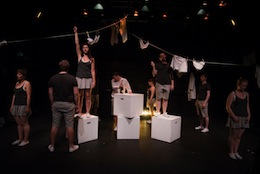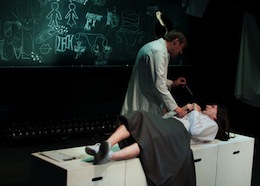Displacement is a primary theme of Polish Theatre Ireland’s production of Julia Holewińska’s Foreign Bodies, an unsettling contemplation of identity politics during and after the fall of communism in Poland. Time is the first victim of this displacement. Anthony Kinahan’s overtly theatrical chorus tells us at the outset that the opening scene depicting a riotous New Year’s Eve party is occurring in 1983 or 1984 or at some point in the 1980s. Here we’re introduced to Adam (a solid Paul Travers) and his circle of anti-communist agitators secretly making and spreading leaflets calling for the downfall of Poland’s communist regime. Jump ahead to an unspecified year in the opening decade of the twenty-first century and we meet Ewa (again played by Travers), a woman obsessing over the details of a dinner party that her friends fail to attend. Now a member of the EU, Poland has abandoned communism in favour of free market capitalism, exemplified by transnational brand names and corporations, private healthcare and education, and determined attempts to erase the remaining vestiges of the socialist state.
Ewa and Adam, of course, are the same person and Holewińska has situated Adam/Ewa to represent, at least in part, a Poland that is struggling to define itself in the midst of monumental social and political upheaval. Mapped onto that struggle is the issue of gender identity and the conflict between one’s own construction of self and social acceptance of that self. Adam’s psychic pain in inhabiting a body that fails to reflect his own sense of self is eased nominally by gender reassignment and his transformation into Ewa, but that transformation does little to affect Adam/Ewa’s full acceptance in either the Poland of the ‘80s or the 2000s.
 Director Lianne O’Shea’s production shifts with relative ease between these two alternate Poland’s as viewed through the prism of Adam/Ewa’s experience. O’Shea’s ensemble cast ably transform time and place through fluid, physical scene changes (aided by Gabriel Peelo’s lighting and Daniel Figgis’s stirring sound design), utilising only a few large wooden blocks and the addition or subtraction of a costume piece. The cast also transition capably from Holewińska’s heightened naturalism (helped by Artur Zapałowski’s colloquial English translation) to her employment of choral dialogue and presentational narration, the bulk of which is provided primarily by Kinahan and Fiona Lucia McGarry. With the rest of the cast somewhat unused during a good portion of the play’s first half, though, it’s possible this narration could have been shared among the other performers, with characters effectively narrating themselves in the manner of story theatre. This could have helped foreground more explicitly the themes of role-play and displacement (in the varied terms of national, economic, social and gender identity) that Holewińska is experimenting with here. Additionally, the two laundry lines that suspend crisp, white undergarments and crisscross the playing space are evocative, but O’Shea (who designed the set) has placed them at a level that blocks some of the upstage action, cutting us off awkwardly from several key moments in the story. The use of a large blackboard on the back wall serves effectively as a silent chorus, though, where images from Holewińska’s text are etched out in white chalk, adding a sort of subconscious layer to the action as it occurs.
Director Lianne O’Shea’s production shifts with relative ease between these two alternate Poland’s as viewed through the prism of Adam/Ewa’s experience. O’Shea’s ensemble cast ably transform time and place through fluid, physical scene changes (aided by Gabriel Peelo’s lighting and Daniel Figgis’s stirring sound design), utilising only a few large wooden blocks and the addition or subtraction of a costume piece. The cast also transition capably from Holewińska’s heightened naturalism (helped by Artur Zapałowski’s colloquial English translation) to her employment of choral dialogue and presentational narration, the bulk of which is provided primarily by Kinahan and Fiona Lucia McGarry. With the rest of the cast somewhat unused during a good portion of the play’s first half, though, it’s possible this narration could have been shared among the other performers, with characters effectively narrating themselves in the manner of story theatre. This could have helped foreground more explicitly the themes of role-play and displacement (in the varied terms of national, economic, social and gender identity) that Holewińska is experimenting with here. Additionally, the two laundry lines that suspend crisp, white undergarments and crisscross the playing space are evocative, but O’Shea (who designed the set) has placed them at a level that blocks some of the upstage action, cutting us off awkwardly from several key moments in the story. The use of a large blackboard on the back wall serves effectively as a silent chorus, though, where images from Holewińska’s text are etched out in white chalk, adding a sort of subconscious layer to the action as it occurs.
 Travers as Ewa walks a thin line between an affected campness and genuine pathos, but succeeds for the most part in forcing us to invest emotionally in Adam/Ewa’s difficult journey through transformations of the physical body and the body politic. Particularly affecting is a scene where Ewa’s attempts to reconnect with her son (John Currivan) go painfully awry, with her son harshly condemning Adam’s transformation into Ewa. It becomes clear that Poland’s adoption of free market values has not translated the country’s social landscape into one that is more tolerant and inclusive.
Travers as Ewa walks a thin line between an affected campness and genuine pathos, but succeeds for the most part in forcing us to invest emotionally in Adam/Ewa’s difficult journey through transformations of the physical body and the body politic. Particularly affecting is a scene where Ewa’s attempts to reconnect with her son (John Currivan) go painfully awry, with her son harshly condemning Adam’s transformation into Ewa. It becomes clear that Poland’s adoption of free market values has not translated the country’s social landscape into one that is more tolerant and inclusive.
Holewińska’s text and its performance is generally sympathetic to Adam/Ewa’s plight, but there seem to be unconscious links being made between Adam’s transformation into Ewa and the adoption of a more self-centred, materialistic construction of Polish society as it embraces the free market. Ewa, a teacher, spends lavishly on cosmetics and gourmet food, as well as pursuing her third masters degree, seemingly in order to enhance her performance as a sophisticated woman, all the while living in a dilapidated house that lacks basic facilities. Her attempts to assure the world and herself of her gender identity appear to be situated by Holewińska to interrogate the suggestion that Poland’s adoption of neo-liberal economic values is simply natural progress, rather than a mode of economic and social organisation that is as much a manufactured means of establishing authority as communism was. These links undercut in part the personal anguish of gender displacement as experienced by Adam/Ewa. “I’ll win them over with my naturalness,” says Ewa about those who might doubt her authenticity, and it feels like the architects of Poland’s free market capitalism could be saying the same thing.
Jesse Weaver